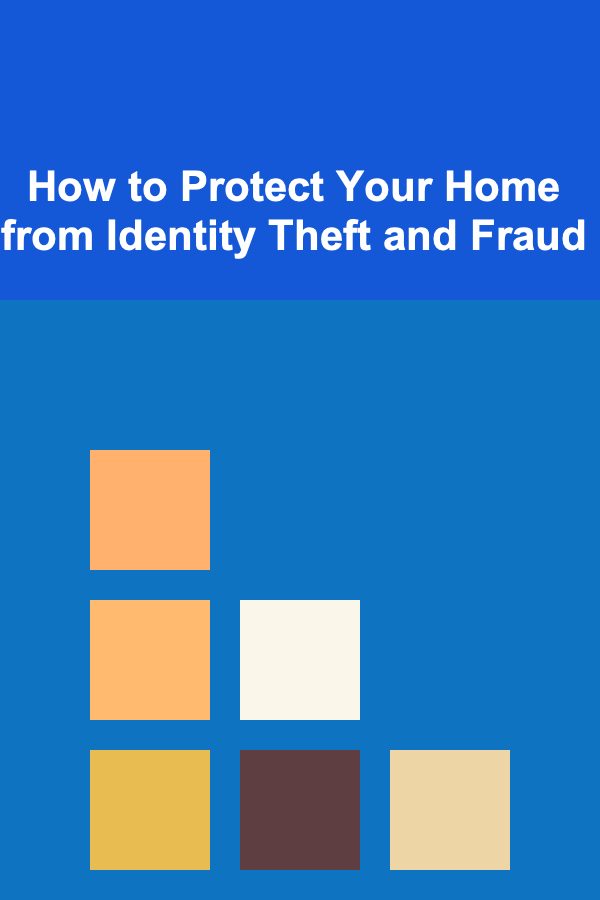
How to Protect Your Home from Identity Theft and Fraud
ebook include PDF & Audio bundle (Micro Guide)
$12.99$5.99
Limited Time Offer! Order within the next:

Identity theft and fraud are growing concerns in today's digital age, and homeowners must be vigilant in protecting their personal and financial information. With the increasing reliance on online services, social media platforms, and interconnected devices, the risks associated with identity theft have escalated, making it crucial to take proactive steps to safeguard your home and the people living in it.
This article will explore comprehensive strategies and practical steps you can take to protect yourself and your family from the devastating consequences of identity theft and fraud. From understanding the basics of these crimes to implementing preventive measures and addressing potential breaches, you'll learn everything you need to minimize your risk and preserve your financial well-being.
What is Identity Theft and Fraud?
Before delving into protective strategies, it's important to understand what identity theft and fraud entail.
Identity Theft
Identity theft occurs when someone illegally obtains and uses another person's personal information---such as Social Security numbers, bank account details, or credit card numbers---without permission, usually for financial gain. The thief may use this information to open fraudulent accounts, make purchases, or even commit crimes in the victim's name.
Identity theft can happen in various ways, including:
- Phishing: Criminals trick individuals into providing sensitive information by pretending to be legitimate entities, such as banks or government agencies.
- Skimming: Fraudsters install devices on ATMs or point-of-sale terminals to capture card details.
- Data Breaches: Hackers exploit vulnerabilities in websites or companies' security systems to steal large volumes of personal data.
- Dumpster Diving: Criminals go through your trash to find documents with sensitive information.
Fraud
Fraud refers to the intentional deception made for financial gain or to secure an unfair advantage. Identity theft is often a precursor to various types of fraud, such as credit card fraud, loan fraud, and tax fraud.
Fraud can occur through methods like:
- Impersonation: A criminal may pose as you to gain access to financial benefits or take loans under your name.
- Social Engineering: Attackers manipulate people into revealing confidential information through deceitful tactics.
- Online Fraud: Fraudsters may use fake websites or emails to steal money or personal information from unsuspecting users.
Now that we understand the nature of these threats, let's explore the steps you can take to protect your home and personal information from identity theft and fraud.
Strengthen Your Home's Cybersecurity
In the digital era, one of the most significant vulnerabilities in protecting your identity is your online presence. Whether it's your personal devices, social media profiles, or online accounts, all of these can be hacked or exploited if not adequately secured.
1.1 Use Strong and Unique Passwords
Your online accounts are your first line of defense against identity theft. Using weak or recycled passwords makes it easier for hackers to gain access to your accounts. Here's how you can make your passwords more secure:
- Create strong, complex passwords: Combine upper and lower case letters, numbers, and symbols to create a password that's difficult to guess.
- Use different passwords for each account: Avoid using the same password across multiple accounts, especially for sensitive accounts like online banking.
- Enable multi-factor authentication (MFA): MFA adds an additional layer of security, requiring a second verification step (such as a code sent to your phone) in addition to your password.
1.2 Keep Your Devices Secure
Hackers often target personal devices to gain access to sensitive information. From smartphones to laptops, ensuring that all your devices are secure is crucial to protecting yourself from fraud.
- Use encryption: Encrypt your devices to ensure that even if they are stolen, the information stored on them remains protected.
- Install anti-virus and anti-malware software: Keep your devices safe from malicious software that can steal your personal information.
- Regularly update software: Many hackers exploit vulnerabilities in outdated software. Make sure your operating system, apps, and security software are always up-to-date.
1.3 Be Cautious with Public Wi-Fi
Using public Wi-Fi networks, such as those in coffee shops or airports, can expose your devices to hackers. These networks are often unencrypted, meaning anyone on the same network can potentially intercept your data.
- Avoid accessing sensitive accounts on public Wi-Fi: If you must use public Wi-Fi, avoid logging into your bank account or entering sensitive personal information.
- Use a VPN (Virtual Private Network): A VPN creates a secure, encrypted connection between your device and the internet, helping protect your data when using public networks.
Protect Your Personal Information at Home
While the digital world is a primary concern, physical security at home is just as important. Identity thieves often target your physical documents to gain access to sensitive data, so safeguarding them is essential.
2.1 Secure Your Personal Documents
Many identity theft criminals gain access to personal information through physical documents. This can include your Social Security card, birth certificate, financial statements, or even credit card offers that may arrive in the mail.
- Use a safe: Store sensitive documents in a fireproof and waterproof safe, making them difficult for thieves to access.
- Shred documents: Shred documents that contain personal information before throwing them away. This includes old bank statements, medical records, or credit card offers.
- Lock filing cabinets: If you store documents in filing cabinets, ensure they are locked, especially if you have roommates or visitors in your home.
2.2 Be Cautious About What You Throw Away
Dumpster diving is a common tactic used by identity thieves to find sensitive personal information. They may go through your trash to find anything they can use, such as bank statements, credit card offers, or medical records.
- Shred sensitive paperwork: Before disposing of documents containing personal or financial information, make sure to shred them. This can be a simple and cost-effective way to protect yourself.
- Be mindful of online bill payments: When making payments online, ensure the website is secure (look for HTTPS in the URL) to prevent your information from being intercepted.
2.3 Monitor Your Mail
Criminals may also steal your identity by taking advantage of mail that is left unsecured or overlooked. They might redirect your mail to their own address or simply take advantage of credit card offers or other sensitive documents.
- Use a lockable mailbox: Consider upgrading to a lockable mailbox to prevent theft of your mail.
- Track your mail: If you're going on vacation or leaving your home for an extended period, request a mail hold through your local post office or have a trusted neighbor collect your mail.
Monitor Your Financial Accounts
Monitoring your financial accounts regularly can help you detect fraudulent activity early on. The sooner you notice suspicious transactions, the quicker you can take action to minimize potential damage.
3.1 Review Your Credit Reports
Your credit report contains a detailed history of your financial transactions, including loans, credit card accounts, and other debts. Identity thieves often use stolen information to open accounts in your name, so it's important to check your credit report regularly.
- Obtain free credit reports: In the United States, you're entitled to one free credit report per year from each of the three major credit reporting agencies (Equifax, Experian, and TransUnion). Check these reports for unfamiliar accounts or inquiries.
- Place a fraud alert or credit freeze: If you suspect that you're a victim of identity theft, consider placing a fraud alert or freezing your credit with the credit bureaus. This will make it more difficult for fraudsters to open new accounts in your name.
3.2 Keep Track of Bank and Credit Card Statements
Review your bank and credit card statements regularly for any unauthorized transactions. If you notice any unfamiliar charges, immediately report them to your bank or credit card company.
- Set up alerts: Many banks and credit card companies offer fraud alerts, which notify you of suspicious activities on your accounts. Enable these notifications to keep track of your financial transactions.
- Use mobile banking apps: Mobile banking apps allow you to check your account balances, review transactions, and report suspicious activity from anywhere.
Be Mindful of Scams and Phishing Attacks
One of the most common ways identity theft occurs is through scams and phishing attacks. Cybercriminals often use fraudulent methods to trick you into revealing your personal information.
4.1 Recognize Phishing Emails and Messages
Phishing emails often appear to come from legitimate sources, such as banks, government agencies, or well-known companies. These emails typically contain links or attachments designed to steal your information.
- Look for red flags: Phishing emails often contain spelling or grammatical errors, generic greetings (e.g., "Dear Customer"), or urgent messages urging you to act quickly.
- Verify the sender: Before clicking on any link or downloading attachments, verify the sender's email address or phone number. Be cautious if the message is unsolicited or requests sensitive information.
- Don't share personal information: Never share sensitive information like Social Security numbers, bank account details, or passwords through email or text messages.
4.2 Beware of Phone Scams
Phone scams, also known as "vishing," are another common way that fraudsters try to steal your identity. They may pose as representatives from companies, the IRS, or even your bank, attempting to obtain your personal information over the phone.
- Don't share sensitive information: If you receive an unsolicited call, don't provide any personal information, especially if the caller is asking for payment or access to your accounts.
- Verify the caller's identity: If you're unsure whether a call is legitimate, hang up and call the company or agency back using a known phone number (found on their official website).
Take Action if Your Identity Is Stolen
Despite your best efforts, identity theft can still occur. If you believe your identity has been compromised, it's crucial to act quickly to minimize the damage.
5.1 Report Identity Theft
If you suspect that your personal information has been stolen or used fraudulently, take the following steps:
- Report it to the authorities: File a report with the Federal Trade Commission (FTC) in the United States, or your country's equivalent authority. This helps track and investigate identity theft cases.
- Contact your bank or credit card company: Notify your financial institutions of any fraudulent activity and request that they freeze or close any compromised accounts.
- Place a fraud alert or credit freeze: Contact the major credit bureaus to place a fraud alert or credit freeze on your credit report.
5.2 Repair Your Credit
Identity theft can have a lasting impact on your credit score and history. You may need to work with credit bureaus to repair your credit by disputing fraudulent accounts and ensuring that your financial history is accurate.
Conclusion
Protecting your home from identity theft and fraud requires a multi-layered approach. By strengthening your cybersecurity, safeguarding your personal information, monitoring your financial accounts, and staying vigilant against scams and phishing attacks, you can significantly reduce the risk of falling victim to these crimes.
Remember that identity theft and fraud can happen to anyone, but by following these preventative steps, you can protect your home and loved ones from the devastating consequences of these crimes. Stay informed, remain cautious, and take action swiftly if you suspect that your identity has been compromised. The more proactive you are in securing your personal and financial information, the better you can protect yourself from fraud and theft in today's increasingly digital world.
Reading More From Our Other Websites
- [Whitewater Rafting Tip 101] Finding Your Flow: How Rafting Can Ignite a Deep, Sustainable Passion
- [Personal Care Tips 101] How to Choose a Body Spray for Maximum Comfort and Freshness
- [Home Family Activity 101] How to Organize a Family Bowling Night at Home
- [Personal Investment 101] Monetize Your Deep Learning Skills: Start Earning Today
- [Home Storage Solution 101] How to Store Holiday Decorations without Taking Up Too Much Space
- [Personal Investment 101] How to Invest in Startups with Crowdfunding Platforms
- [Organization Tip 101] How to Maintain an Organized Pantry Long-term
- [Toy Making Tip 101] Crafting Quest-Ready Toys: A Step-by-Step Guide to Your First Adventure Gear
- [Personal Care Tips 101] How to Find the Best Acne Treatment Cream for Acne on Your Back or Chest
- [Needle Felting Tip 101] How to Build a Complete Needle Felting Kit on a Budget

How to Decorate Your Home for New Year's Eve with Elegant Touches
Read More
How to Make Money Online as an Actuary: 10 Actionable Ideas
Read More
How to Make the Most of Your Income with a Zero-Based Budget
Read More
How to Use Coupons and Discounts to Stick to Your Home Budget
Read More
How to Use Lighting to Create the Perfect Ambiance for Entertaining
Read More
How to Build a Realistic Diorama of a WWI Trench
Read MoreOther Products

How to Decorate Your Home for New Year's Eve with Elegant Touches
Read More
How to Make Money Online as an Actuary: 10 Actionable Ideas
Read More
How to Make the Most of Your Income with a Zero-Based Budget
Read More
How to Use Coupons and Discounts to Stick to Your Home Budget
Read More
How to Use Lighting to Create the Perfect Ambiance for Entertaining
Read More